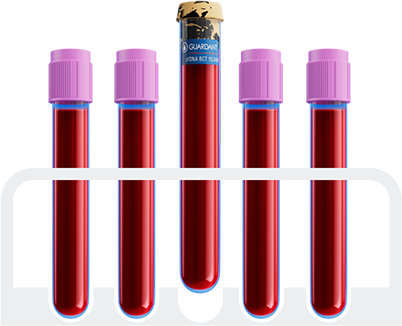Patients who are not up to date with screening
are at increased risk of CRC mortality1
Over
75% of people who died from CRC
were not up to date with screening1
CRC remains the second-leading
cause of cancer-related deaths in
Hong Kong.2
CRC screening can drastically increase survival outcomes when detected early3
5-YEAR SURVIVAL RATE
BASED ON STAGE OF DIAGNOSIS3
| Early Stage (I-II) |
91% | |
|---|---|---|
| Late Stage (IV) |
16% |
getting diagnosed after their disease has spread.4,5
Blood-based CRC screening fits right in.
Simply done.
ShieldTM is a blood test that can be completed at any patient visit6,7
A blood-based approach is the patient-preferred screening option for CRC8*
This option fits into patients’ schedules and breaks through screening
barriers since it requires9
from family or work
It also fits right into a provider’s practice
If providers can order a complete blood count for their patients, they’re equipped to ordera blood-based CRC screening test.8
Shield demonstrated 90% compliance in real-world clinical settings.10,11†
ECLIPSE validates Shield as a high-sensitivity blood test for CRC screening that is easy to complete‡

ECLIPSE is one of the largest studies and the first of its kind to validate a blood test that detects CRC with high sensitivity13
- Validated Shield in over 10,000 patients10
- Included a diverse population representative of US demographics with broad ethnic and socioeconomic backgrounds12,13¶
- Patients aged 45 to 84 at average risk for CRC13§
Results are consistent with a growing body of evidence that demonstrates the high sensitivity of our blood-based technology.14
*In a study, patients who initially refused colonoscopy preferred screening with a blood-based test over a stool-based test 83% vs 15%, respectively.8
†Compliance rate for the first 8,000 patients that were prescribed Shield and completed it.6
‡The ECLIPSE study (NCT04136002) is comparing the sensitivity and specificity of cfDNA only Shield with findings from subsequent colonoscopy in over 10,000 average-risk patients.10,12
§Patients had no prior diagnosis of CRC, inflammatory bowel disease, or family history of genetic risk for CRC (eg, Lynch syndrome).12
||Specificity detected for advanced neoplasia defined in ECLIPSE as CRC or advanced adenomas.10,13
¶With more than 200 clinical trial sites in rural and urban communities across 34 states, study participant demographics included 13% Black, 15% Hispanic, and 7% Asian American populations. The study achieved above-average enrollment among Black Americans for a clinical trial.12,16
cfDNA=cell-free DNA.
- The assay is intended to be complementary to and not a replacement for current recommended colorectal cancer screening methods
- Patients with an "abnormal signal detected" Shield test result should be referred for colonoscopic evaluation
- A "normal signal detected" Shield test result does not preclude the presence of colorectal neoplasia, and patients should continue participating in guideline-recommended screening programs
- Shield was developed, and its performance characteristics determined, by the Guardant Health Clinical Laboratory in Redwood City, CA, USA, which is certified under the Clinical Laboratory Improvement Amendments of 1988 (CLIA) as qualified to perform high complexity clinical testing. This test has not been cleared or approved by the US FDA









